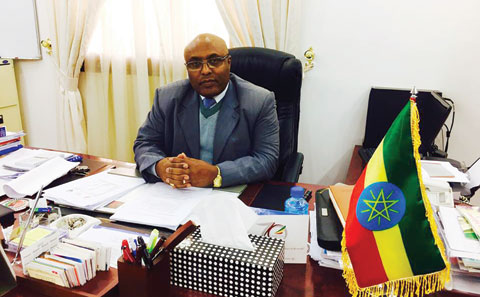 Zenebe Kebede, Deputy Head of Mission and Minister Counselor at the Embassy of Ethiopia
Zenebe Kebede, Deputy Head of Mission and Minister Counselor at the Embassy of Ethiopia
KUWAIT: The Ethiopian Embassy in Kuwait denied social media reports that some Ethiopian women were beaten and abused by police in a Jahra prison. "No, they were not beaten or abused by the police. Probably verbal tussles occurred, but they were not abused or mistreated," clarified Zenebe Kebede, Deputy Head of Mission and Minister Counselor at the Embassy of Ethiopia in Jabriya. "We immediately attended to the case when we received the reports from social media and concerned people. We visited the prison immediately, but found no harassment or abuse took place."
A cellphone video circulated on Facebook and Ethiopian websites in December, showing more than 10 women in a single cell, several of them lying on the floor, explaining their pitiful conditions in Amharic and claiming they were beaten and abused. "The room was probably small but they were transferred immediately to well-maintained deportation facilities," Kebede said.
Runaway maids
Reports said the women may have been imprisoned for up to a week before the video leaked last month. Kebede confirmed the women were detained at the Naeem prison in Jahra. "They were housemaids who had run away from their employers and had absconding cases filed against them with the authorities. They were arrested by the police at a checkpoint. There are crackdowns going on in Kuwait against expats who are in violation of immigration policies, and these Ethiopians were among those people who were arrested. They were rounded up and taken by the police, and after a few days, they were transferred to the deportation facilities in Jleeb where they were treated fairly, and following deportation procedures, they were sent back home," Kebede explained.
"I call it an isolated case. They were treated fairly like any other violator and they were placed in the deportation center for a few days only. Now all of them are in Ethiopia. We are working with the police officials here with mutual respect and understanding of laws. We know they are very supportive when Ethiopians are detained and they let us know about it. We then process the necessary travel documents," he mentioned.
There are about 54,000 Ethiopians in Kuwait, 50,000 of them working as domestic workers. The Ethiopian government has banned sending domestic helpers abroad including the Middle East and Kuwait. "The ban, or suspension, is in place to address the issue of human trafficking. What we do now is that we negotiate with countries over the rights and obligations of both the employers and workers. If the agreement is clear, only then we send domestic workers abroad," Kebede noted.
No shelter
Unlike other domestic labor exporting countries like the Philippines and Sri Lanka, Ethiopia does not have its own shelter at the embassy. "We do not have a shelter because we have few runaways, and because they can be accommodated in the facilities run by the government. We try to help by negotiating with employers - for example if their salaries are not paid, we demand the employer to pay them and provide them with air tickets to return home," he asserted.
As part of its escalating "Kuwaitization" strategy, Kuwait has cracked down on undocumented migrant workers in recent years - authorities deported over 25,000 expats through the Talha deportation prison last year alone. Most deportees belonged to 10 nationalities, with Bangladeshis, Ethiopians, Sri Lankans and Indians topping the list. Authorities claim they try to expedite deportations to avoid overcrowding, as Talha prison can only accommodate 800 persons. The Ministry of Interior no longer depends exclusively on Kuwait Airways to secure departure tickets for deportees, but still often waits for sponsors or embassies to process documents and arrange travel documents.
By Ben Garcia




